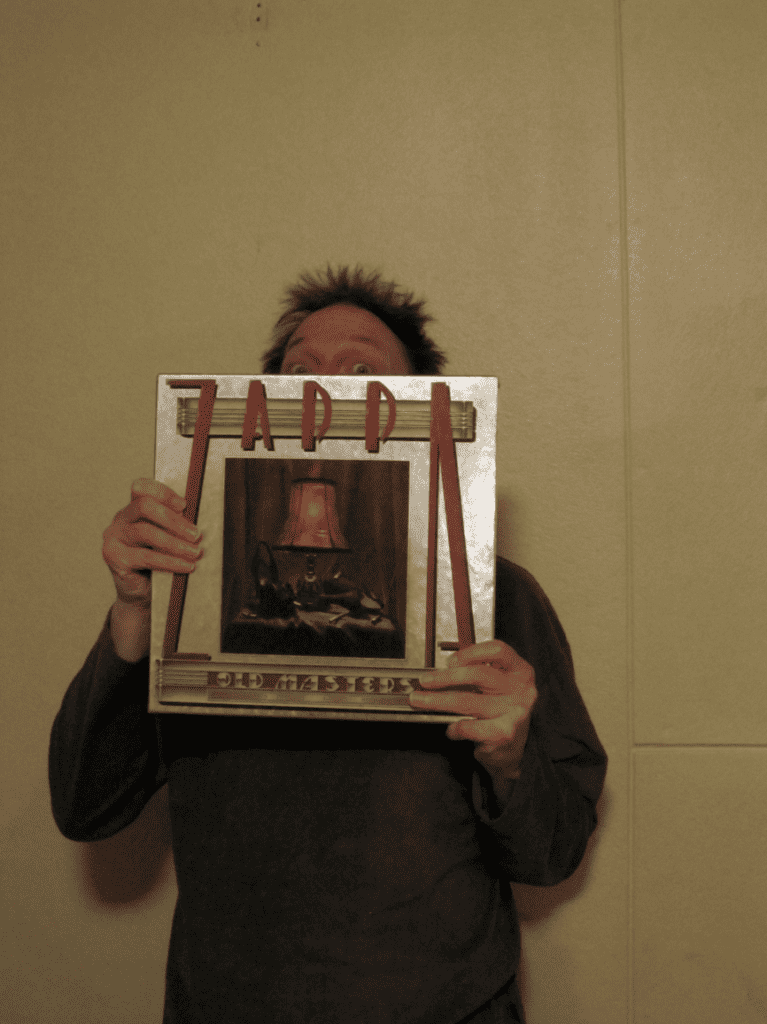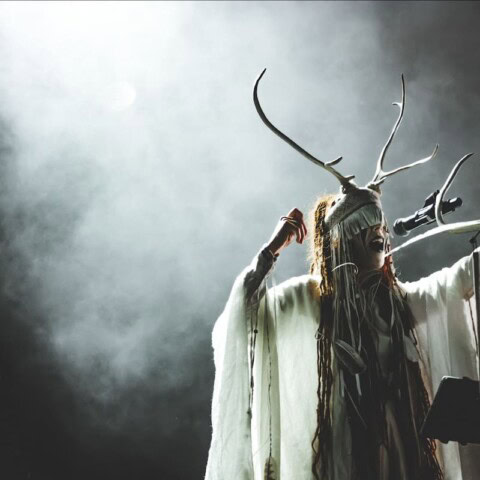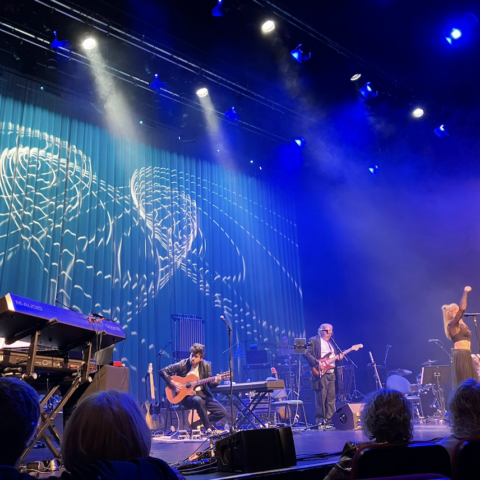RICHARD BETTS speaks with award-winning NZ composer Sarah Ballard who meditates her music into being.

I interview a lot of composers. Everyone’s method is different. For some, music comes quickly and easily, others slave over every note. Sarah Ballard is the only person I’ve spoken with who composes through meditation.
If you think that makes her sound like a lightweight new age artist, don’t be fooled. She’s on the verge of receiving her Doctor of Musical Arts, won the 2012 NZSO Todd Young Composer award and has been the National Youth Orchestra’s composer in residence.
Ballard’s latest work, Prema Lahari, receives its world premiere on Sunday 5 July, when it’s performed by NZTrio at Auckland Town Hall’s Concert Chamber. Witchdoctor put her through our patented Q&A:

Richard Betts – You’ve written a new piece, Prema Lahari, for NZTrio. How did you come to be involved in this project?
Sarah Ballard – I’d just finished my Doctor of Musical Arts at Victoria University last year, and the trio heard a piece called Paramatma. They said they really liked what they heard and they wanted me to write something along those lines for their ensemble. Paramatma was related to my bhakti-yoga practice, which is the main inspiration for me now. Over time my inspirations morph and change into different things and at the moment it’s kind of settled on that. And then I stay within that realm for some time before I move on to something else, but I feel like this is going to be more like a lifelong preoccupation.
Richard – I think of your music as texturally very rich and often using extended techniques (where instruments are played in non-traditional ways). I’m thinking particularly of Paramatma and works like Meditation. How do you do what you do within a traditional piano trio format?
Sarah – Well, this one is very simplified and stripped back. My work seems to be becoming more simplified, but it doesn’t mean that I’m not going to go back to more complexity, that just depends on the circumstances at the time, but I felt that this one needed to be more about the pitch and harmony. Basically, the whole piece is centred around one harmony; it’s like one big drone. It’s very simple. It’s just a short piece but it’s more like a meditation. I guess the idea is that it can help the audience feel this kind of meditation that I go through on a daily basis, which is a huge part of my compositional process.

Richard – Tell me more about Prema Lahari. What was NZTrio’s brief?
Sarah – The brief was that they really were inspired by the traditional Indian elements and maybe the bhakti influence in my music. They wanted something that had that same kind of driving force behind it, and they were suggesting ragas, traditional melodic patterns or even rhythms. It was a very simple brief, I felt very happy to work with that. At the beginning, I’ve got a recording of an Indian instrument that’s very beautiful and is rich in overtones. It just kind of cycles very meditatively, and I’ve got the cello sort of playing in sync with that. I’ve been really into scalic material so there are a lot of beautiful flourishes. A lot of other composers think that it may be a little bit too simplistic but I’m just so drawn to this movement of pitch, it creates a lot of beauty. And it’s very tonal. It stays around similar melodic patterns that are very conventional. I think in this piece I’m just looking at that magnetism traditional tonality has. There’s no way of escaping [traditional tonality], it’s always been so powerful.
Richard – You mentioned the simplicity. Some of your earlier works were quite complex. Does the simplicity come from your yoga practice or is that just you developing as a composer? Or can you not distinguish between those two things?
Sarah – I think it is both. Sometimes less is more. And, you know, if we’re practising yoga, we’re trying to develop higher qualities that are going to help move us forward and become better people and form better relationships with everyone in the world. So part of becoming a real yogi is to become more simple and to have fewer demands on the material body so as to demand less from Mother Earth or the environment that we live in. So I think that development of a more simplistic way of living, that’s certainly affected my music. I think that’s the way that it’s manifesting musically.
Richard – Paramatma reminds me of the chant-like qualities of jazz musicians like John Coltrane or Yusef Lateef, and it’s on the cusp of traditions: Western classical and Indian. From what you say, the new work is similar. Do you think of yourself as a classical composer? What is it that you do?
Sarah – It’s hard to say. I don’t really think of myself completely as a classical composer, in that I feel that a lot of classical composers study deeply the works of other composers, and then sort of put together things that they’ve experienced or heard. For me, it’s not like that at all. I don’t really rely on anything. I don’t even listen to much classical music. [Composition] is like a meditation for me. I meditate on the subject and then I wait for the notes to present themselves to me. I really feel the music has a life, an intelligence of its own. I feel strongly about that. I’m like a conduit for something more energetic that comes through.
Richard – If you don’t listen to classical, what do you listen to?
Sarah – I listen to a lot of meditation music. There’s a lot of traditional Indian instruments that can come into it. I’m very much in love with the timbres of those instruments. I guess I’m just getting that the impetus is coming from another place at the moment, rather than back to that Western classical tradition.
Richard – Was Paramatmaa a complete break from what you were doing before, or is there a through-line from your earlier work?
Sarah – I think it is a complete break. I tend to do that. My nature is that I can be quite changeable and adaptable. I don’t really get set in a groove. But I think there are melodic tendencies that you can trace. There’s always an underlying emotional aspect to my work that I think runs throughout. Often people have said that my music sounds quite sensuous and I think that carries through.
Richard – Is your fascination with Indian culture or with yogic practice?
Sarah – It’s a fascination with yogic practice. What is yoga? What’s the purpose of yoga? And also more deeply on an existential level. What is our purpose? Why are we here? Why is there so much duality in the world? And kind of trying to solve these problems through sound because I think sound is really the basis for everything. Even sound creates form so without sound, even our material physical bodies wouldn’t be present.

Richard – Where did this fascination come from?
Sarah – It came through my journey as a composer, actually. As a composer, I was always searching within my music, trying to address these questions, trying to address my experiences in the world. And I always had some kind of relationship with something higher or some kind of divinity that I felt. I’m not saying that I’m a good composer at all, but we know that composers like Beethoven, Mozart, they also had this awareness of some sort of divinity and they drew on that compositionally. It kind of just led me to question more and I found that things would occur in my life that led me towards those answers. Gradually I came upon bhakti yoga and within that tradition, sound is the main focus, so immediately I felt very much at home and it drew me in. It just so happens that the culture that it pertains to is India, but in the ancient texts, it says that that culture once was a global culture. It was a singular culture. So it’s not actually specifically Indian, it’s just that the remnants of it lie in that tract of land that’s known as India today.
Richard – How do you manage to incorporate traditional elements without it either sounding like a pastiche or cultural tourism?
Sarah – That’s a good question. I’m not quite sure. I think because I’m a practitioner myself. I sing, I play on a regular basis, it’s part of my practice. I’m very inspired by people like Jahnavi Harrison, who’s British. She was born in England but she’s very much absorbed elements of that tradition and I think that’s kind of gone into my psyche. I’m not imitating her, but I just kind of feel the movement of the notes in a certain way that has some kind of relationship to that traditional Indian style of playing. But it’s more like a fusion. So I feel like it’s kind of combining that with all of my past compositional experience, then it’s coming out of something that sounds more original, rather than just simply regurgitating some kind of stylistic language.
Richard – The depth to which you’ve dived into your yoga practice, can you see that superseding your composition or is it just indivisible?
Sarah – It’s kind of indivisible, it’s all part of one process. And there are different facets to it. I perform at Bhakti Lounge. I plan to perform in more pieces with contemporary classical ensembles, or I might have a piece for string quartet where I really try to get back to that complexity of sound, but it’s situated in this more tonal context. So I feel like I have many branches but they’re all completely interlinked. I don’t really see any division between them, it’s all just different expressions of the same force.
* NZTrio perform Prema Lahari in its world premiere Sunday 5 July at Auckland Town Hall’s Concert Chamber.














